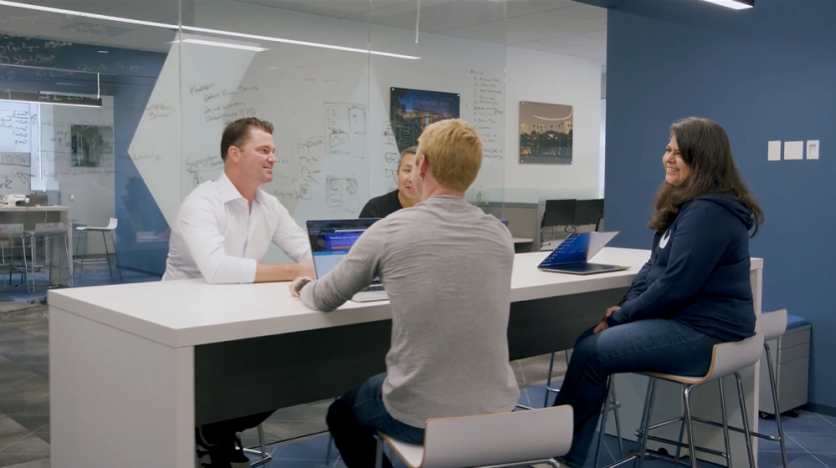
There is no shortage of noise and new messages these days in the rapidly burgeoning AI spaces, both consumer and business-facing. But for me, it's very straightforward: The vision that underpins the work happening in our organization comes back to empowering humans at the end of the day. We are committed to being the best enterprise AI solutions company built by people for people, boosting them to achieve more than ever before as we supercharge human capability, adapt to any circumstance, and uphold AI for Good.
In this dynamic, fast-paced digital age, people need a way to up-level their capability to do more than what's humanly possible, especially at work. In my view, artificial intelligence isn't a tool to replace humans; instead, it's one to enhance their performance and ensure they remain competitive, accomplishing more than ever. So, we sought to create a platform that connects hundreds of cognitive and generative AI models on an integrated and extensible development framework that supports a portfolio of AI technology applications that solve real-world problems for real-world workers and prove that through AI technology, people could be empowered to do more than what was previously humanly possible. As part of that, core connectivity is a big piece: zeroing in on the human work process and getting to the core of why and how people do what they do. We knew this could streamline processes and innovate with tangible use cases.
We find that, especially in the enterprise AI adoption and integration journey, the key at this stage of the game centers around adaptability. With the advent of generative AI technologies, every corner of the business world is seriously talking about AI and how to adopt it. The challenge is that most companies are at different stages in their AI journey, and what they need most is guidance on how and where to implement AI solutions effectively. I believe it's the job of companies like Veritone to be the best at educating businesses about the capabilities of AI and how they can apply it to solve their unique challenges, and it's our goal to lead the discussion in identifying the most successful places to implement AI.
And as much or more than any piece of why I'm in this business, it's about "AI For Good." AI is already changing how people work, but with any change comes headwinds. Many are concerned about what their future will look like with AI. The power of AI is real and thrilling, but nothing should be implemented at the expense of making society less safe, transparent, or vibrant. AI for Good is a foundational standard of ethics that drives our organization, from product development to data and IP protection, revealing in a transparent way exactly how our technology works and why it's safe to use. Leveraging our AI for Good foundation, we can do the important work of combatting the improper use of AI and prioritize the "how," as in how our company as a leader—and the entire space itself—is defending against misuse, and fostering public trust, security & compliance, along with, of course, empowerment. This kind of self-policing is so key in our industry right now, and I like to think that we can learn a lot from previous epochs in tech, like social media, that left important discussions for regulators more than a decade after rolling out platforms. The opportunity here is to learn from that and have companies lead with accountability from the start.
Core Industry Vertical Use Cases
Content remains king in the media & entertainment (M&E) industry, driving everything from regional expansion to revenue growth. However, M&E organizations need to move beyond how they've conducted their content operations historically. As the content cycle is shrinking, putting M&E organizations under unprecedented stress and pressure, operations must be optimized to ensure organizations are making the most out of their existing content and making meaningful and impactful new content. Veritone, for example, offers solutions that can track everything that's said and spoken on a broadcast, prove ad attribution, and manage and monetize content, thus empowering creators in a novel way to focus on the bigger picture and leave the mundane to AI. This also helps connect the storytellers of the world to reach wider, more diverse audiences and demonstrates how AI enables people to focus more on being creative and driving revenue rather than backend operations.
Right now, we spend a lot of time unpacking how decision-makers in M&E can apply AI to improve their content management to drive greater revenue, along with helping to identify the most successful places to implement AI for custom projects. But of course, your content is only as good as your people. AI can do many great things but never replace human creativity. Our team has always believed in the power of AI, but not at the expense of harming creators' job security, cloning voices without permission, or replacing humans, and we're proud to stand behind those messages in the marketplace. I'm proud that we have an impact on ethical practices involving AI development and the storage and use of training data in a positive way.
We're also super excited about the limitless potential to empower the HR space to hire like never before. Talent acquisition has to evolve to adapt to changing hiring objectives and constantly fluctuating economic conditions. Balancing these external pressures against the primary mission of finding the best people for the job, hiring teams need a way to bolster their capability. You already have a talented hiring team—now it's about enhancing their capabilities with AI to help them find, connect, and hire faster. To find the best people no matter their budget and connect hiring professionals with the tools, candidate pools, and data they need to make smarter, faster recruiting decisions. We enjoy helping enterprises truly grasp how they can automate the hiring process, giving them back more time to focus on other tasks and increasing their capability.
At the beginning of the AI implementation process, we often find that recruiters worry about a lack of transparency in how the technology works and the danger of it perpetuating bias and potentially replacing their role. Regulations have already started to make their way through legislatures across the country to set an industry standard for the explainability of AI in the TA space. That's why it's important for firms to proactively audit their own AI recruitment technology in order to increase transparency and explainability to customers. This helps get out in front of unpacking why AI isn't introducing risk of bias in recruitment processes and ensuring the customer knows how and why AI isn't "going off the rails," but instead, fostering ethical practices involving AI development and the storage and use of training data in a positive way. In our case, PandoLogic (a Veritone company that we acquired in 2021) completed a third-party bias audit for its AI technology in Q1 2023. The audit focused on AI models within programmatic and candidate chat to identify the risk of introducing bias. Both solutions were deemed a low risk for bias and, in some cases, were found to help increase diversity efforts.
When it comes to the public sector, government agencies are facing unprecedented pressure to modernize their operations amidst constantly fluctuating and often shrinking budgets. With AI, public sector agencies can expand what's humanly possible so they can focus on their primary mission and purpose while assisting teams across a variety of functions to do their jobs more efficiently, reducing burnout and stress. In this industry, we're talking in broad strokes about answering the call for backup. With the advent of generative AI technologies, the federal government has started an AI task force to explore the use of the technology. Many do not understand how to apply AI to their unique mission and overcome security and compliance concerns. Decision makers in this sector need help understanding the practical capabilities of AI and how they can apply it to automate evidence management, audio and video redaction, and more. AI has entered the conscience of the public sector as a necessary, if not mission-critical, tool. However, with AI comes many concerns, such as security and compliance and the safe use of the technology, which contributed to the 2023 executive order on AI. Veritone aims to set the standard in the ethical development, implementation, and use of AI technology to meet safety and compliance requirements and protect digital evidence and associated data.
Again, we're just scratching the surface of the AI revolution in these industries. I can't wait to see what the coming decade will bring. The key will be the continued balance of innovation and responsibility, with the focus for us remaining on driving more new positive outcomes in the performance and well-being of humans above all.
About Ryan Steelberg

As the Chief Executive Officer of Veritone and with over 25 years of technology and media leadership experience, Ryan is uniquely positioned to discuss the broad-based principles that shape the use, application, and value of artificial intelligence and how, in turn, those principles share and inform Veritone's mission and vision.
About Veritone
Veritone (NASDAQ: VERI) designs human-centered AI solutions. Serving customers in the talent acquisition, media, entertainment, and public sector industries, Veritone's software and services empower individuals at the world's largest and most recognizable brands to run more efficiently, accelerate decision-making, and increase profitability. Veritone's leading enterprise AI platform, aiWARETM, orchestrates an ever-growing ecosystem of machine learning models, transforming data sources into actionable intelligence. By blending human expertise with AI technology, Veritone advances human potential to help organizations solve problems and achieve more than ever before, enhancing lives everywhere.
ⓒ 2025 TECHTIMES.com All rights reserved. Do not reproduce without permission.




